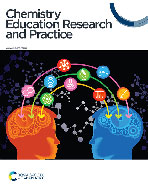Secondary chemistry teacher learning: precursors for and mechanisms of pedagogical conceptual change
Abstract
Despite years of research and practice inspired by chemistry education research, a recent report shows that US secondary instruction is not aligned with current national reform-based efforts. One means to mitigate this discrepancy is focusing on pedagogical conceptual change, its precursors (higher self-efficacy and pedagogical discontentment), and the subtleties of its mechanisms (assimilation and accommodation). In this study, we investigate the final reflections of participants (N = 35) who completed our professional development program known as the VisChem Institute (VCI). Our results show that Johnstone's triangle as well as evidence, explanations, and models can be conducive for stimulating pedagogical discontentment among VCI teachers who exhibit higher self-efficacy. In addition, how VCI teachers assimilate and/or accommodate reform-based chemistry teaching ideas problematizes conventional assumptions, broadens application of novel theories, and is germane to introductory chemistry learning environments across the world. Implications and recommendations for chemistry instruction and research at both secondary and tertiary levels are discussed.


 Please wait while we load your content...
Please wait while we load your content...
